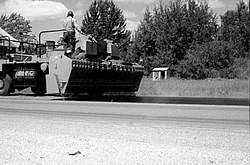U.S. Department of Transportation
Federal Highway Administration
1200 New Jersey Avenue, SE
Washington, DC 20590
202-366-4000
Focus
| Accelerating Infrastructure Innovations |
Publication Number: FHWA-RD-00-059
Date: June 2000
 |
| Between 1992 and 1996, preventive maintenance treatments, such as the chip sealing shown here, saved Michigan DOT an estimated $700 million. |
For highway agencies, times are changing. "It's no longer about constructing roads," says Jim Sorenson of the Federal Highway Administration (FHWA). "It's about preserving and maintaining the existing roads." And for an increasing number of States, preserving those roads means using preventive maintenance techniques. Instead of waiting until a road has significantly deteriorated before rehabilitating it, preventive maintenance involves applying carefully timed, cost-effective treatments to roads experiencing only light to moderate distress. These treatments help retard pavement deterioration, improve the function/condition of the highway system, and can extend the life of a structurally sound pavement by 5 to 10 years.
In order to assist highway agency managers in using preventive maintenance techniques, FHWA, the Foundation for Pavement Preservation, and the American Association of State Highway and Transportation Officials (AASHTO) Lead States Team for Pavement Preservation have prepared a new videotape, Preventive Maintenance: Project Selection. The video is a follow-up to an earlier FHWA release, Protecting Our Pavements: PREVENTIVE Maintenance, which was aimed at upper-level management. The new video is geared more toward the maintenance supervisors and program managers who make the daily decisions to implement various preventive maintenance treatments.
The video takes an in-depth look at the project selection process, highlighting the key factors for achieving optimum results with preventive maintenance. It recommends that highway agencies take the following steps:
"Preventive maintenance is now an integral part of Michigan's highway program," says Larry Galehouse of the Michigan Department of Transportation (DOT), who is featured in the video. "We will never go back to not doing it." Between 1992 and 1996, preventive maintenance treatments saved Michigan an estimated $700 million.
To obtain a copy of the video, contact your local FHWA division office or the Foundation for Pavement Preservation at 517-381-0549.
Copies can also be obtained from the International Slurry Surfacing Association, Asphalt Emulsion Manufacturers Association, and Asphalt Recycling & Reclaiming Association. These organizations can be reached at 410-267-0023 (fax: 410-267-7546; email: krissoff@toad.net.) For more information on the video, contact Jim Sorenson at FHWA, 202-366-1333 (fax: 202-366-9981; email: james.sorenson@fhwa.dot.gov), or Larry Galehouse at the National Center for Pavement Preservation: 517-432-8220 (Fax: 517-432-8223; E-mail: ncpp@egr.msu.edu)